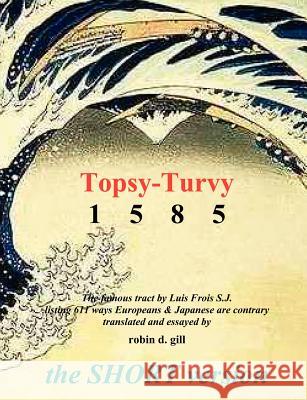Topsy-turvy 1585 - THE SHORT VERSION » książka
Topsy-turvy 1585 - THE SHORT VERSION
ISBN-13: 9780974261836 / Angielski / Inna / 2005 / 460 str.
At 460 pages, this is the short version of Topsy-turvy 1585, a critical yet entertaining essay of the 611 ways Europeans and Japanese were considered contrary to one another, according to Luis Frois S.J. (1532-1597), a prolific letter writer who sent more information about Japan to Europe than anyone before or since. The book includes a full English translation of his treatise (Tratado em que se contem . . .), of the 611 topsy-turvy items, each only two-lines long (a distich)in the original, and hundreds of additional topsy-turvy items in the Foreword on the history of Topsy-turvy and within the much longer annotations by translator-critic robin d. gill. The Tratado was not an exercise in what we now call Orientalism, but precocious cultural relativism born in connection with the revolutionary new Jesuit policy of Accommodation. Note that Herodotus made dozens of black and white contrasts between Egypt and the Greco-Roman civilization he called "the rest of the world;" Alberuni (Il Biruni) did the same for India and the West (mostly what Occidentals now call the Middle East); but no one found hundreds as did Frois for Europe and Japan. Some of Frois's contrasts are almost expected: We paid to have night-soil removed; They paid for the night-soil. Some are a surprise: Our (European) women were far less free than Japanese women at that time. And some are just plain fun: We sniff melons on the top to see if they are ripe; Japanese do so on the bottom. (There is a reason for this, but you must buy the book to learn it). This is a book that is meant to educate and entertain. The author is known in Japan for writing books against stereotypes, explaining how differences between cultures and people are exaggerated. So, he is the perfect person to introduce the most radical book of difference ever written."











